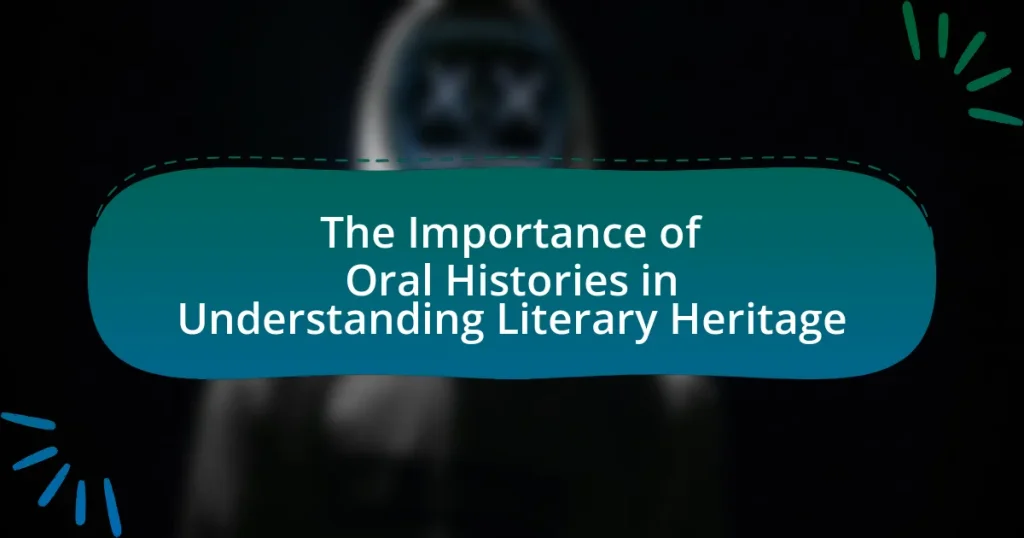The article examines the significance of oral histories in understanding literary heritage, emphasizing their role in preserving cultural narratives and traditions that enrich literary works. It highlights how oral histories provide insights into community values, beliefs, and experiences, thereby contextualizing literature within historical and social frameworks. Key elements such as personal narratives, cultural context, and community engagement are discussed, along with methods for collecting and analyzing oral histories. The article also addresses the challenges and limitations researchers face, including issues of reliability and representativeness, while outlining best practices for ensuring authenticity and enhancing the presentation of oral histories in literary studies.

What is the significance of oral histories in literary heritage?
Oral histories are significant in literary heritage as they preserve cultural narratives and traditions that might otherwise be lost. These narratives provide insight into the values, beliefs, and experiences of communities, enriching the understanding of literary works by contextualizing them within their historical and social frameworks. For instance, oral traditions have been crucial in the transmission of folklore and storytelling practices, which have influenced written literature across various cultures. Studies show that oral histories contribute to the authenticity and depth of literary heritage by capturing diverse voices and perspectives, thereby fostering a more inclusive representation of history.
How do oral histories contribute to our understanding of literary traditions?
Oral histories significantly enhance our understanding of literary traditions by preserving cultural narratives and providing insights into the values and beliefs of specific communities. These narratives often reflect the historical context in which they were created, revealing how societal changes influence literary forms and themes. For instance, oral traditions in Indigenous cultures have shaped their storytelling techniques and thematic elements, which are evident in contemporary literature. Research by scholars such as Walter Ong highlights that oral traditions foster a communal memory, allowing literary forms to evolve while maintaining connections to their origins. This interplay between oral histories and literary traditions underscores the importance of oral narratives in shaping and enriching literary heritage.
What are the key elements of oral histories that enhance literary heritage?
The key elements of oral histories that enhance literary heritage include personal narratives, cultural context, and community engagement. Personal narratives provide unique, firsthand accounts that capture individual experiences and emotions, enriching the literary landscape with diverse perspectives. Cultural context situates these stories within specific traditions and practices, preserving linguistic nuances and societal values that contribute to a deeper understanding of a community’s literary identity. Community engagement fosters collective memory and shared storytelling, ensuring that oral histories are passed down through generations, thereby maintaining continuity in literary heritage. These elements collectively reinforce the significance of oral histories in documenting and celebrating the richness of cultural narratives.
How do oral histories preserve cultural narratives within literature?
Oral histories preserve cultural narratives within literature by capturing and transmitting the lived experiences, traditions, and values of communities across generations. These narratives are often recorded through storytelling, interviews, and community gatherings, ensuring that unique cultural perspectives are documented and shared. For example, the oral traditions of Indigenous peoples have been crucial in maintaining their histories and worldviews, which are often absent from written records. Studies, such as those by the Smithsonian Institution, highlight how oral histories serve as vital sources for understanding cultural identity and heritage, reinforcing the importance of these narratives in literature.
Why are oral histories considered a vital source of literary knowledge?
Oral histories are considered a vital source of literary knowledge because they preserve unique cultural narratives and perspectives that are often absent from written records. These narratives provide insights into the lived experiences, traditions, and values of communities, enriching the understanding of literary heritage. For example, oral traditions in Indigenous cultures often convey historical events, moral lessons, and social norms that inform their literature, thus serving as a foundational element of their literary canon. Furthermore, studies have shown that oral histories can reveal the complexities of identity and social dynamics, which are crucial for a comprehensive understanding of literary contexts.
What unique perspectives do oral histories provide compared to written texts?
Oral histories provide unique perspectives by capturing personal narratives and emotional nuances that written texts often overlook. These spoken accounts reflect the lived experiences and cultural contexts of individuals, offering insights into social dynamics, traditions, and values that may not be documented in formal literature. For example, oral histories can reveal the impact of historical events on communities through firsthand testimonies, such as those collected during the Great Depression, which highlight personal struggles and resilience that written records may generalize or omit. This depth of personal connection and immediacy in oral histories enriches our understanding of literary heritage by presenting diverse voices and experiences that contribute to a more comprehensive historical narrative.
How do oral histories reflect the diversity of literary voices?
Oral histories reflect the diversity of literary voices by capturing a wide range of cultural narratives and personal experiences that are often overlooked in written literature. These narratives provide insight into the lives of marginalized communities, showcasing their unique perspectives and storytelling traditions. For example, oral histories from Indigenous peoples reveal distinct worldviews and histories that differ significantly from mainstream literary canon, thus enriching the overall literary landscape. Furthermore, studies such as “The Power of Oral History” by Barbara Allen highlight how oral traditions preserve linguistic diversity and cultural heritage, demonstrating that these voices contribute significantly to the richness of literary expression.

How can oral histories be effectively collected and utilized?
Oral histories can be effectively collected and utilized by employing structured interviews, ensuring a diverse range of voices, and integrating the narratives into educational and cultural contexts. Structured interviews, which include prepared questions and prompts, help guide the conversation while allowing for personal storytelling, thus capturing detailed accounts. Ensuring diversity in participants, such as including various age groups, ethnicities, and backgrounds, enriches the oral history collection and reflects a broader spectrum of experiences. Furthermore, integrating these narratives into educational programs and cultural exhibitions enhances public understanding of literary heritage, as evidenced by projects like the StoryCorps initiative, which has recorded over 600,000 personal stories, demonstrating the impact of oral histories on community engagement and historical preservation.
What methods are used to gather oral histories in literary studies?
Oral histories in literary studies are primarily gathered through methods such as interviews, focus groups, and participant observation. Interviews involve direct conversations with individuals who share their personal narratives and experiences related to literary works or traditions. Focus groups facilitate discussions among multiple participants, allowing for a collective exploration of themes and perspectives. Participant observation enables researchers to immerse themselves in communities or events, capturing the context and nuances of oral storytelling practices. These methods are validated by their widespread use in ethnographic research, which emphasizes the importance of firsthand accounts in understanding cultural and literary heritage.
How do interviews and recordings play a role in preserving oral histories?
Interviews and recordings are essential for preserving oral histories as they capture firsthand accounts and personal narratives that reflect cultural and historical contexts. These methods allow individuals to share their experiences, emotions, and perspectives, which are often lost in written records. For instance, the Library of Congress’s American Folklife Center has documented thousands of oral histories through interviews, providing invaluable insights into diverse communities and their traditions. This preservation of voices ensures that future generations can access authentic representations of the past, contributing to a richer understanding of literary heritage.
What ethical considerations must be taken into account when collecting oral histories?
When collecting oral histories, ethical considerations include informed consent, confidentiality, and the potential impact on participants. Informed consent requires that individuals understand the purpose of the oral history project and agree to participate voluntarily, ensuring they are aware of how their narratives will be used. Confidentiality involves protecting the identities and personal information of participants, especially when discussing sensitive topics, to prevent harm or distress. Additionally, researchers must consider the potential impact of sharing these histories on the participants and their communities, as narratives can evoke strong emotions or alter public perceptions. These ethical guidelines are essential to uphold the dignity and rights of individuals contributing to oral histories.
How can oral histories be integrated into literary analysis?
Oral histories can be integrated into literary analysis by serving as primary sources that provide context, voice, and perspective to literary texts. This integration allows scholars to examine the cultural, social, and historical backgrounds that shape narratives, enriching the understanding of themes and character development. For instance, oral histories from marginalized communities can reveal lived experiences that challenge or complement the representations found in literature, thus offering a more nuanced interpretation of texts. Studies, such as those by Alessandro Portelli in “The Death of Luigi Trastulli and Other Stories: Form and Meaning in Oral History,” demonstrate how oral narratives can illuminate the complexities of identity and memory, thereby enhancing literary analysis.
What frameworks exist for analyzing oral histories within literary contexts?
Frameworks for analyzing oral histories within literary contexts include narrative analysis, ethnographic approaches, and thematic analysis. Narrative analysis focuses on the structure and content of stories told by individuals, allowing researchers to understand how personal experiences shape literary narratives. Ethnographic approaches emphasize the cultural and social contexts of oral histories, providing insights into how these narratives reflect community values and collective memory. Thematic analysis identifies recurring themes and motifs within oral histories, facilitating connections between individual stories and broader literary traditions. These frameworks are validated by studies such as “Oral History and the Politics of Memory” by Alistair Thomson, which illustrates the significance of oral narratives in shaping historical understanding and literary expression.
How do oral histories enhance the interpretation of literary texts?
Oral histories enhance the interpretation of literary texts by providing contextual background and personal narratives that enrich understanding. These histories offer insights into the cultural, social, and historical circumstances surrounding the creation of literary works, allowing readers to grasp deeper meanings and themes. For example, oral traditions can reveal the lived experiences and values of communities, which may not be explicitly represented in the texts themselves. This connection between oral histories and literature is evident in works like Zora Neale Hurston’s “Their Eyes Were Watching God,” where the incorporation of African American oral traditions deepens the narrative’s authenticity and emotional resonance. Thus, oral histories serve as a vital tool for interpreting literary texts, bridging the gap between the written word and the lived experiences of individuals and communities.

What challenges do researchers face in utilizing oral histories?
Researchers face several challenges in utilizing oral histories, primarily including issues of reliability, subjectivity, and accessibility. Oral histories often rely on personal recollections, which can be influenced by memory distortions or biases, making it difficult to ascertain their accuracy. For instance, a study by the Oral History Association highlights that memories can be shaped by subsequent experiences, leading to inconsistencies in accounts. Additionally, the subjective nature of oral narratives can result in varying interpretations of events, complicating the analysis for researchers. Accessibility also poses a challenge, as many oral histories are recorded in formats that may not be easily transcribed or archived, limiting their availability for broader research purposes.
What are the limitations of oral histories in literary heritage studies?
Oral histories in literary heritage studies have several limitations, primarily related to reliability, subjectivity, and representativeness. The reliability of oral histories can be compromised due to memory distortions, as individuals may forget details or alter their narratives over time. Research indicates that memory can be influenced by various factors, leading to inaccuracies in recounting events (Hirst & Manier, 2008).
Subjectivity is another significant limitation, as personal biases and perspectives can shape the storytelling process, resulting in a narrative that may not reflect broader historical truths. This subjectivity can lead to the exclusion of alternative viewpoints, thereby limiting the richness of the literary heritage being studied.
Additionally, oral histories may lack representativeness, as they often focus on specific individuals or groups, potentially overlooking marginalized voices or experiences. This can create an incomplete picture of the literary landscape, as certain narratives may dominate while others are silenced.
In summary, the limitations of oral histories in literary heritage studies stem from issues of reliability, subjectivity, and representativeness, which can hinder a comprehensive understanding of literary traditions.
How can issues of reliability and accuracy affect oral history research?
Issues of reliability and accuracy significantly impact oral history research by undermining the credibility of the narratives collected. When oral histories are based on faulty memories or subjective interpretations, the information may be distorted, leading to misconceptions about historical events. For instance, studies have shown that human memory is fallible; research by Elizabeth Loftus indicates that memories can be influenced by subsequent information, which can alter a person’s recollection of events. This distortion can result in a skewed understanding of literary heritage, as the narratives may reflect personal biases rather than objective truths. Consequently, the validity of oral histories as reliable sources for understanding cultural and literary contexts is compromised, necessitating careful cross-examination with other historical records to ensure accuracy.
What strategies can be employed to overcome challenges in oral history research?
To overcome challenges in oral history research, researchers can employ strategies such as establishing trust with interviewees, using clear and open-ended questions, and ensuring proper recording techniques. Establishing trust is crucial, as it encourages participants to share their stories more openly, which is supported by studies indicating that rapport significantly enhances the quality of oral histories. Utilizing clear and open-ended questions allows for richer narratives, as it encourages interviewees to elaborate on their experiences rather than providing simple yes or no answers. Additionally, employing proper recording techniques, including high-quality audio equipment and backup methods, ensures that the data collected is reliable and usable for analysis, as evidenced by best practices in qualitative research.
What best practices should be followed when working with oral histories?
Best practices for working with oral histories include obtaining informed consent from participants, ensuring accurate transcription of interviews, and preserving recordings in a secure and accessible format. Informed consent is crucial as it respects the autonomy of the interviewee and clarifies how their stories will be used, which is supported by ethical guidelines from organizations like the Oral History Association. Accurate transcription is essential for maintaining the integrity of the narratives, as misinterpretations can distort the original meaning. Additionally, preserving recordings in a secure format, such as digital archives, ensures long-term accessibility and protection against data loss, aligning with best practices in archival science.
How can researchers ensure the authenticity of oral histories?
Researchers can ensure the authenticity of oral histories by employing rigorous verification methods, including cross-referencing accounts with existing historical records and utilizing audio-visual documentation during interviews. This approach allows researchers to corroborate the details provided by interviewees with established facts, thereby enhancing the credibility of the oral narratives. For instance, a study published in the “Journal of Oral History” highlights that triangulating oral testimonies with archival materials significantly increases the reliability of the information gathered. Additionally, researchers can implement standardized interview protocols to minimize bias and ensure consistency in data collection, further supporting the authenticity of the oral histories.
What techniques can enhance the presentation of oral histories in literary studies?
Techniques that can enhance the presentation of oral histories in literary studies include the use of multimedia elements, narrative structuring, and contextual framing. Multimedia elements, such as audio recordings and visual aids, can provide a richer sensory experience, making the oral histories more engaging and accessible. Narrative structuring involves organizing the oral histories into coherent stories that highlight key themes and emotions, which can help convey the significance of the experiences shared. Contextual framing situates the oral histories within broader historical, cultural, or social contexts, allowing for deeper understanding and analysis. These techniques have been shown to improve audience engagement and comprehension, as evidenced by studies that demonstrate increased retention and emotional connection when oral histories are presented in a dynamic and contextually rich manner.


